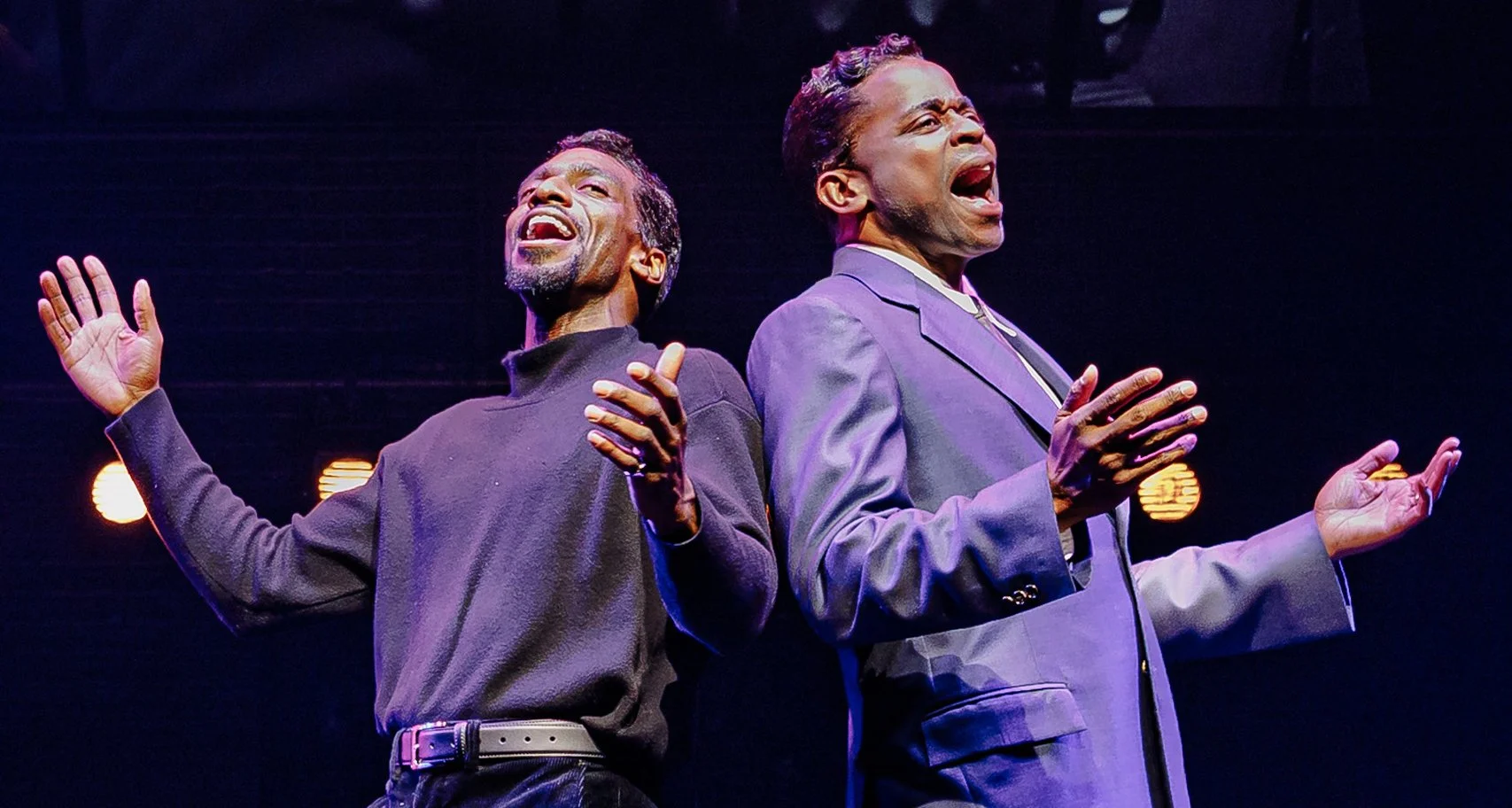Daniel J. Watts (left) as Sammy Davis Jr. and Dulé Hill as Nat “King” Cole tap-dance in a duet that is a highlight of the new musical Lights Out: Nat “King” Cole at the New York Theater Workshop.
Lights Out: Nat “King” Cole is a fanciful fever dream of the final taping of The Nat King Cole Show on NBC in December of 1957. This musical hits some high notes with Dulé Hill and Daniel J. Watts’ excellent acting but is hamstrung by a disjointed book by Colman Domingo and Patricia McGregor, who also directs.
The lights go up on a flurry of activity. The stage manager (Elliott Mattox) is engaged in tuning the band. Satisfied with the overall balance and harmonious sound, he turns to the house, informing them that they will be the live studio audience for today’s show.
Hill portrays the iconic Nat “King” Cole in Lights Out: Nat “King” Cole, co-written by Colman Domingo and Patricia McGregor.
In the next beat Cole (Hill) enters, with everybody on the set bursting into the song, “For He’s a Jolly Good Fellow.” But beneath the surface of the cheerful tribute, there’s the knowledge that all is not well with the American Dream in the mid–20th century. For though Cole had become a likable brand and helped to move the dial for the acceptance of blacks into mainstream entertainment, after 64 groundbreaking episodes, NBC was showing him the door.
His close friend and fellow entertainer, Sammy Davis Jr. (Watts), however, is on hand to rip away the veil and expose the prejudice behind NBC’s decision to replace The Nat King Cole Show with The Californians. The latter show, with its all-white performers, had easily secured a national sponsorship. As Davis put it:
Old King Cole was a Merry Old Soul, and a Merry Old Soul was he. But today, December 17th, 1957, his namesake is anything but merry. This program had seemed to have all the ingredients necessary for success: top-notch production values, the best musical and variety talent which had been seen on the NBC network, a Negro starring in his own show, not in a subservient or obsequious role à la Amos ‘n’ Andy, but as the host, the equal of all the great talents, black or white. But to most potential advertisers, fearful that their sales in the South would be impacted, it was reason enough for sponsors to avoid the show. It seems very clear, that Madison Avenue is afraid of the dark.
“Cole’s program had seemed to have all the ingredients necessary for success.”
Cole, of course, realized that his so-called marketable persona depended on the whims of Madison Avenue. Even his makeup artist Candy (Kathy Fitzgerald) has a ritual of applying white powder to his face before he goes on the air. Even though he objected to this humiliating routine, his objections—“I’d like to recognize myself for once, Candy”—were ignored.
Although many turned a deaf ear to him, Cole stood for racial equality. And the parade of 1950s luminaries on his show included both black and white performers. One sees the sophisticated Eartha Kitt (purr-fectly inhabited by Krystal Joy Brown), the dynamic Betty Hutton (Ruby Lewis), the sultry Peggy Lee (Hutton again), and Cole’s own daughter Natalie (Brown again), who sings “Unforgettable” with him to pin-drop silence.
Then there’s the up-and-comer Billy Preston (Mekhi Richardson), who is confident enough to ask Cole to join him in singing, “Blueberry Hill.” When Cole agrees, they croon lyrics that slyly points up their generation gap, not to mention their shared philosophical bent:
Sammy Davis Jr. and Nat “King” Cole belt out a song together. Photographs by Marc J. Franklin.
Though we’re apart
You’re part of me still
For you are my thrill
On Blueberry Hill.
A supernatural element breezes in with the ghost of Cole’s mother, Perlina (Kenita Miller), who sees her son biting his nails and intuits that it’s over his struggles with sponsorship. Echoing Eleanor Roosevelt’s wisdom, she tells him: “It’s better to light a candle than curse the darkness.” Then she reinforces that mood by transitioning into the swing-infused jazz ballad “Orange Colored Sky.”
When it comes to acting, Dulé and Watts are at the top of their game in every scene they appear in, separately or together. But it’s their tap-dance duet, performed to the overlapping harmonies of “I’m Gonna Sit Right Down and Write Myself a Letter” and “Me and My Shadow,” that is the show’s high point.
The production’s Achilles’ heel is its book. According to a note in the script, Domingo and McGregor have conceived the characters in the show as “a part of Nat’s psyche in the fever dream.” This conceit works fine in theory. However, in execution the narrative at times becomes incoherent, with the musical’s book lacking a clearly-defined spine.
Despite that flaw, Lights Out is a thoroughly engaging show that examines a cultural icon who broke through racial barriers in the musical industry. It’s worth a trip to the East Village.
Colman Domingo and Patricia McGregor’s Lights Out: Nat “King” Cole plays through June 29 at New York Theatre Workshop (79 E. 4th St.). Evening performances are at 7 p.m. Tuesday through Sunday; matinees are at 2 p.m. Saturday and Sunday. Beginning June 1, evening performances are at 7 p.m. Tuesday through Saturday (no evening performance June 19; added evening performance June 22 at 7 p.m.); matinees are at 2 p.m. Wednesday, Saturday, and Sunday. For tickets and more information, visit nytw.org.
Book: Colman Domingo & Patricia McGregor
Music & Lyrics: Nat King Cole & others
Direction: Patricia McGregor
Scenic Design: Clint Ramos
Costume Design: Katie O’Neill
Lighting Design: Stacey Derosier
Sound Design: Alex Hawthorn & Drew Levy
Choreography: Edgar Godineaux
Tap Choreography: Jared Grimes





